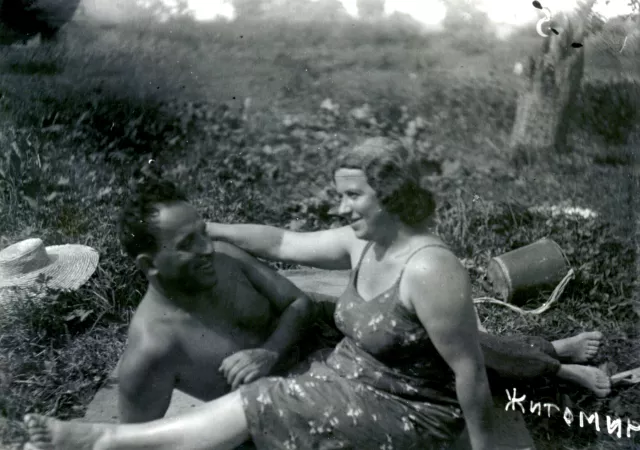Semyon Ghendler‘s father Zachari Ghendler and mother Yelizaveta Ghendler
My parents Zachari Ghendler and Yelizaveta Ghendler (nee Oks) photographed during vacation on the Teterev River in Zhitomir in the late 1930s.
My parents met in 1925 and fell in love with one another. My father was a strong handsome man. My mother was young and fair-haired. They made a beautiful match. In 1926 my parents got married. I don't know any details about their wedding. All I know is that it was a traditional Jewish wedding. The young couple was so happy to have their parents' consent that they didn't argue about having a chuppah, and rabbi and a marriage contract, though by this time they had given up religion. They had a traditional wedding in Zhitomir where they invited relatives from Ovruch and Korosten and then my parents had a civil ceremony in a registry office.
My mother or father never joined Komsomol or the party, but they were atheists. In the early 1930s we lived in Olevsk of Zhitomir region, 70 km from Zhitomir. My father was offered to work in a store and the family moved to this town. We lived with some relatives in a wooden house with a garret. I have dim memories of famine in 1932-33, when my father brought some packages from his work. This was dried bread that we dipped in water before eating them. I remember a constant feeling of hunger, but nobody died in our family, though there were dead people in the streets every morning and special trucks picked them. We stayed in Olevsk less than a year. My father proved to be good in trading business. Although he didn't have any special education he was offered to become director of a fish store and in 1935 he got an offer to become director of a big food store in Zhitomir. We returned to Zhitomir. We got an apartment in Zhitomir. My father had an average income sufficient to make a decent living. My mother didn't work before the Great Patriotic War. On weekends my parents and I went to the riverbank. My father went swimming and my mother was waiting on the bank looking at him. They enjoyed talking to one another and my sister and I joined our friends.
We also celebrated Soviet holidays at home. My parents invited their friends. They danced to the wireless and sang Soviet songs. The only reminder of Jewish traditions was matzah that my grandfather always brought at Pesach. At Pesach and Rosh Hashanah we visited my grandfather where they had family gatherings or went to visit my father's parents in Ovruch. The family discussed family news and enjoyed getting together.
On 22 June 1941 my friend Beba Shames and I were to go to a pioneer camp. At 12 o'clock we listened to Molotov on the radio. He said that the Great Patriotic War began. On 24 June 1941 my father volunteered to the army. Shortly afterward he came home during the retreat of our troops. I can still remember him in his uniform, having a gun. He was an officer. This was on 4 July 1941. My father washed and helped my mother to pack and then we went to the railway station on a truck waiting for us. My father took us to the station where we boarded a train heading to the East. My father kissed us and then stood with my mother on the platform for a long while. I even felt hurt that he spent so much time with her saying such a short 'good bye' to us. He hugged and kissed her. I didn't know then that I was seeing him for the last time. My father perished in 1941 near Kanev in 100 km from Kiev, and was buried in a common grave.












